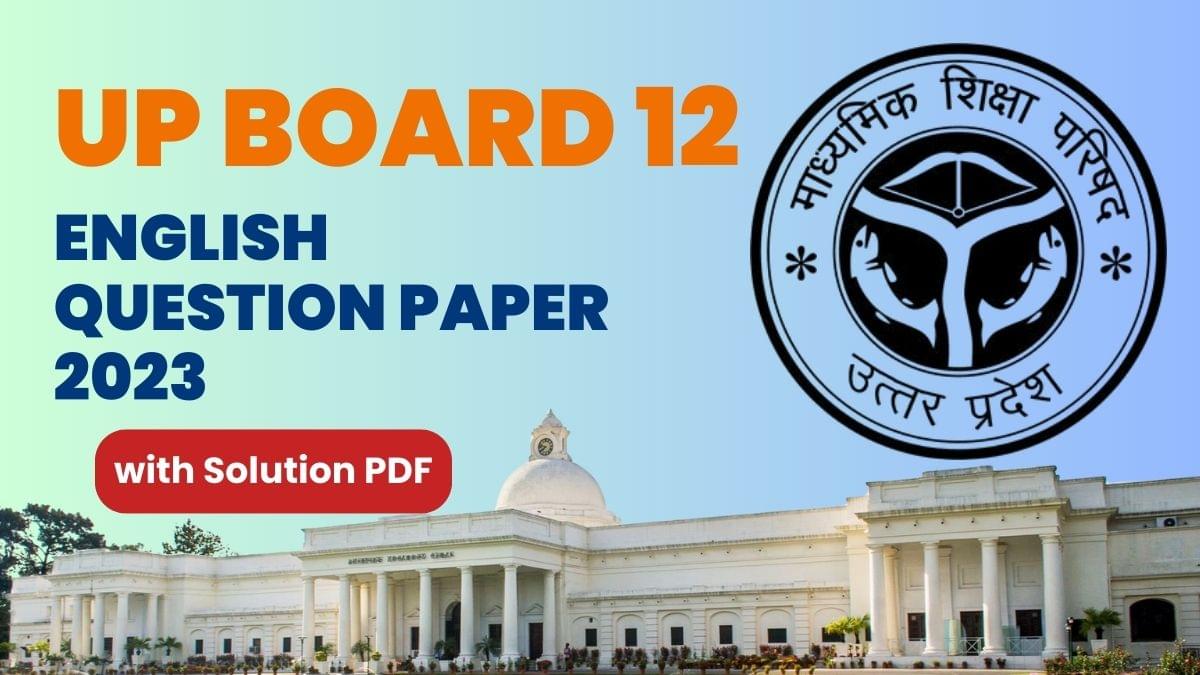UP Board Class 12 English Question Paper with Answer Key Code 316 ZY is available for download. The exam was conducted by the Uttar Pradesh Madhyamik Shiksha Parishad (UPMSP) on February 24, 2023 in Afternoon Session 2 PM to 5:15 PM. The medium of paper was English. In terms of difficulty level, UP Board Class 12 English paper was . The question paper comprised a total of 12 questions.
UP Board Class 12 English (Code 316 ZY) Question Paper with Answer Key (February 24)
| UP Board Class 12 English (Code 316 ZY) Question Paper with Answer Key PDF | Download PDF | Check Solutions |

Read the following passage carefully and answer the questions that follow:
If we want success in any undertaking, we must work steadily to the end. No undertaking is attained without difficulties. Sheridan, a famous orator of England, attempted to make a speech in the Parliament but failed and sat down in great discomfiture. His friend told him that he could not be an orator. He replied, “It is in me and shall come out,” and he afterwards succeeded in becoming a persuasive orator of his day. The late Earl of Beaconsfield also broke down in the midst of his maiden speech in the House of Commons. He sat down in the midst of hisses but he told the audience with some emotion, “I have several times begun many things and often succeeded at last. I shall sit down now, but the time will come, when you will hear me.” These words afterwards proved to be prophetic. We should not, therefore, be discouraged by disappointment at the beginning of life
What must be done if we want to succeed in any undertaking?
What did Sheridan do when he failed to make a speech in the Parliament?
What did Sheridan mean when he said that ‘It is in me and shall come out’?
What do you learn from the passage?
Which word in the passage means ‘embarrassment’?
What do you mean by the phrase ‘proved to be prophetic’?
Write an article on any one of the following topics in about 100–150 words:
Write a letter to your younger brother warning him against some of his undesirable companions.
Write an application to the Principal of your college requesting him to organize Annual Sports in time.
A selfish person who always thinks of himself is called:
The phrase ‘to hail from’ means:
The synonym of ‘derogatory’ is:
“Unless you will not work hard, you will not succeed.”
Which word/part in the above sentence is an error?
The antonym of ‘savage’ is:
Change any one of the following into indirect narration:
Combine any one of the following as directed:
Transform any one of the following as directed:
Correct any one of the following sentences:
Use any one of the following pairs of words in your own sentences to make the difference in their meanings clear:
What did M. Hamel say about the French language?
Where is Seemapuri situated?
What did Roosevelt say about the fear of death?
Why did the man selling rattraps resort to begging and petty thievery?
Mention the hazards of working in the glass bangles industry.
The story ‘The Rattrap’ is both entertaining and philosophical. Discuss.
Read the following extract carefully and answer the questions that follow:
Fishermen in the cold sea
would not harm whales
and the man gathering salt
would look at his hurt hands.
What would the fishermen not do?
What would the man gathering salt do?
What moment is the poet talking of?
Write the central idea of any one of the following poems:
What was the birthday gift that Maharaja spotted in a toyshop?
Who is Mr. Lamb? How does Derry get into his garden?
Why would none of the other little creatures like to play with Roger Skunk?
Why did Dr. Sadao's father send him to America?
When and how did Charley find Sam's letter?
How is the study of Antarctica useful to us?




Comments